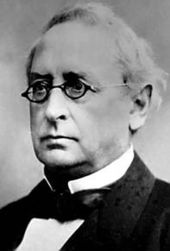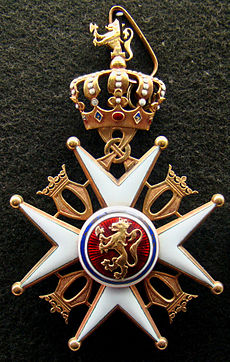- Christian August Selmer
-
Christian Selmer
MP
2nd Prime Minister of Norway in Christiania In office
1880–1884Monarch Oscar II Preceded by Frederik Stang Succeeded by Christian Homann Schweigaard Personal details Born Christian August Selmer
16 November 1816
HaldenDied 1 November 1889 (aged 72)
Aker (Akershus)Nationality Norwegian Political party Conservative Party Spouse(s) Anna Sylvia Leganger Occupation Politician Profession clerck Religion Church of Norway Christian August Selmer (16 November 1816 in Fredrikshald – 1 September 1889, on Bygdøy) was a Norwegian politician who served as a member of the Norwegian parliament, minister of defense, minister of justice, and prime minister. He was the second prime minister to serve in Christiania.
Selmer's record as prime minister was characterized by the conflict over whether members of cabinet were required to appear in parliament to answer questions. He influenced King Oscar II to reject efforts at a compromise, setting the stage for impeachment proceedings in 1883 to 1884. Selmer was convicted and removed from office.
It was subsequently found that Selmer had conspired with the king to overrule the impeachment results, institute unlimited veto rights for the king, and use force against any resulting insurrection.
Life
Christian Selmer succeeded as Prime Minister Frederik Stang 1880. Fast locked in his optimistic belief that his ultra-right line in constitutional struggle had victories in the end, he headed the government until the system's final defeat by impeachment 1884.
Selmer grew up in Halden, enrolled 1837, and after an excellent juridicum 1842 he became District attorney in southern England. 1846 he came to Christiania, and was clerk, first in the Justice Department and later the Ministry of Finance, 1849 until he became clerk to the PA attorney Midelfart in Drammen, a business he took over two years later. He was city recorder in Drammen 1862 to 1974 (and the magistrate to 1872). As a lawyer, he was highly regarded, and as city recorder / magistrate launch himself considerable merits as a highly skilled senior officials, including through his work with kidney regulation of Bragernes by fire in 1866.
Politically, Selmer without any ambition, and it was with reluctance and the pure sense of duty, he allowed himself to choose the Member of Parliament 1870 and persuaded to re-election 1873. In the same manner and with the same feelings in 1874 he took over the post of Army Minister. As a Member of Parliament, he marked himself with impassioned posts in both the case and Council voting issue, both issues that he feared would upset the Constitution's separation of powers principle. As skilled civil servant and convinced supporter of the existing political system was a natural choice to the state council. But when he was called in 1880 to succeed Stang as prime minister, was due to King Oscar's desire to get a government that, in contrast to the rod, was his personal affection and more docile. From both left and right Selmer was considered too easy for the position, and he came not to put any mark on the government. A weak heart kept him also away from most government meetings. In the altdominerende constitutional battle, however, was the price determined, and despite the fact that several ministers of different reasons, wanted to leave, held the government together.
In Parliament searched left majority to force a change of government by making life unbearable for the Ministry of Selmer bevilgningsnektelser with resolutions that intervened in the administration area and an order that was in direct conflict with the government's power-sharing policy. The government in turn sought to address this with compromises that interacting the principal challenges, but the other to stand firm in the hope that an increasingly large part of the people would wake up and rise against the Liberal Party's aggressive nationalism and attacks on the existing social order. But parliamentary elections in 1882 was another defeat for the government. Liberals made big inroads into the traditionally conservative bykretsene and got the "impeachment majority": all seats in Lagting and retention of the majority in Odelsting.
Selmer and King Oscar
Prime Minister Selmer, whose courage was as inexorable as his optimism, however, was determined to continue the struggle until the next election, and he trusted the king's support. King Oscar, however, was not as resolute. He weighed in a serious hand compromise proposal from the Liberal Party and discussed the matter with the Selmer. But Selmer was not convinced that an impeachment was inevitable. Fearless he warned sharply against the capitulation that any compromise would entail, and he was the king back on the opposition line. But only for a time. Already in February 1883 was compromising the idea again alive with the king, public opinion in Sweden started to discourage him - and encourage the Liberals, who were aware that Sweden would not act against an impeachment.
Even after Odelsting brought a suit in April 1883, did not waver Selmer. He still saw opportunities, and ultimately to a conviction oversittes. Developments during the spring and summer showed that only this last possibility remained, and in a meeting with the king on Sofiero castle, the plan established for such a course. But discussions over the year showed that such plans had few supporters in the government and likely would split the right group in parliament.
27. February 1884 fell verdict of Prime Minister Selmer, who was sentenced to embetsfortapelse and imposed large costs. The verdict provoked indignation in the government and right circles, but a flare resistance will soon disappeared, and 11 March Selmer announced resignation. In addition to the Grand Cross of Nordstjärneorden (1880) and the Order of St. Olav (1882), he was now a Knight of Serafimerorden. A little later he was appointed generalauditør for army and navy.
Personally did not Selmer heavy sentence, he saw himself as a martyr for a good cause and unfairly convicted in a political process. When the Conservative party that was organized in August 1884, he was willing to stand as a candidate for chairman of the most extremist groups, but achieved only 9 votes. An overwhelming majority chose Emil Stang progressive moderate-conservative politics and rejected his father Frederik Stang's system, which Selmer had stood for.
References
Political offices Preceded by
Frederik StangPrime Minister of Norway
1880–1884Succeeded by
Christian Homann SchweigaardHeads of government of Norway First Ministers, 1814–1873 
Prime Ministers, 1873–1905 Prime Ministers, 1905–1940 WWII 1940–1945 Nygaardsvold (Prime Minister in exile, 1940-1945)
Quisling (Prime Minister, 1940 coup) • Christensen (Chairman of the Administrative Council, 1940) • Terboven (German Commissioner for Norway) • Quisling (Minister President, 1942-1945)Prime Ministers, 1945– Gerhardsen • Torp • Gerhardsen • Lyng • Gerhardsen • Borten • Bratteli • Korvald • Bratteli • Nordli • Brundtland • Willoch • Brundtland • Syse • Brundtland • Jagland • Bondevik • Stoltenberg • Bondevik • Stoltenberg1865-Present Frederik Stang • Christian August Selmer • Johan Fredrik Thaulow • Ernst Motzfeldt • Andreas Martin Seip • Kristian Wilhelm Engel Bredal Olssøn • Hans Jørgen Darre-Jenssen • Hieronymus Heyerdahl • Torolf Prytz • Jens Meinich • Fridtjof Heyerdahl • Nikolai Nissen Paus • Erling Steen • Ulf Styren • Torstein Dale • Hans Høegh • Bjørn Egge • Bjørn Bruland • Astrid Nøklebye Heiberg • Thorvald Stoltenberg • Sven MollekleivCategories:- 1816 births
- 1889 deaths
- Norwegian politicians
- Presidents of the Norwegian Red Cross
- Members of the Parliament of Norway
- 19th-century Norwegian people
- Norwegian politician, 19th century birth stubs
Wikimedia Foundation. 2010.

